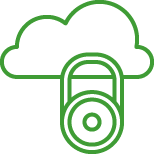Transitioning from a desktop product to a cloud accounting package is one of the best decisions you could make for your business this year. Here’s what you need to know about making the switch.
If you’re a tech savvy business owner, there is no doubt you’ve been introduced to the wonderful world of cloud accounting and enjoyed the many benefits that this type of technology can bring to you. But if technology is a topic that makes you nervous, it’s likely the concept of storing your business data on the ‘cloud’ is enough to make your skin crawl.
I know what you might be thinking…
 “is it secure enough?”
“is it secure enough?”
“what if our financials get hacked?”
 “why would I even want to store my accounts in the cloud?”
“why would I even want to store my accounts in the cloud?”
“what IS the cloud anyway?!” 
...and that’s okay!
But it’s time to start understanding the method behind the madness and learn what cloud accounting is all about, and how your business will benefit from embracing this game-changing technology.
What is cloud accounting?
To put it simply, the ‘cloud’ refers to storing and accessing your data over the internet, rather than on your actual computer. Because your data isn’t stored on a single device, this provides flexibility that the business world has never seen before. Providing you have a reliable internet connection, cloud technology gives you the ability to access business data from any device, at any time and from anywhere around the world.
Efficiencies in business are important. The cloud is the ultimate efficiency technology that will vastly improve the way you operate your business. Cloud accounting technology is no different. Your cloud accounting software provider, usually Xero, MYOB or QuickBooks, will provide you with a username and password and, voila! You can now access your accounting data and all of your financial information instantly through the internet!
There are many advantages of switching over to a cloud accounting package, but below is a highlight of why you should consider transitioning your accounts onto the cloud today.
Advantages of switching to a cloud accounting package
1. Bank feeds
All offer a single sign on with your nominated bank, meaning you can automatically pull over your transaction history from your credit and debit accounts. Not only will this mean you no longer have to manually enter in this information, but your data will be consistent throughout all records.
2. Collaboration and access levels
Cloud accounting enables you to collaborate efficiently with your team, your bookkeeper and your accountant. Every user will get their own unique username and password to sign into your cloud accounting software, and you can tailor their access to suit their needs.  For example, you might want your sales team to only have access to the invoicing section of your package. On the other hand, you can enable your accountant to have full access to your system, allowing them to get in and access all the data they need to process your accounts correctly.
For example, you might want your sales team to only have access to the invoicing section of your package. On the other hand, you can enable your accountant to have full access to your system, allowing them to get in and access all the data they need to process your accounts correctly.
3. Reporting
One of the most exciting features of cloud accounting is the ability to pull live data from your system and feed it into different reporting tools and applications to give you more accurate insights into your business’ performance. There are many reporting tools and applications available, but each of these will be able to take your accounting data directly from your cloud accounting system and provide you with a detailed dashboard of your financial information, such as your cash flow forecasts or sales results.
For more information
Contact your local RSM office for more information on transitioning over to a cloud accounting package. Every business is different and your advisor will discuss your situation with you to ensure you receive the best package to fit your business’ needs.
